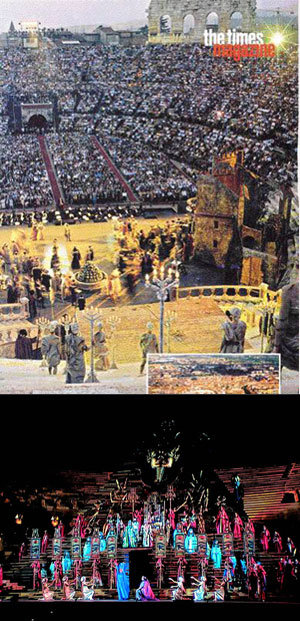Aidas Sad Love Runs Like Starlight at Verona Opera Festival
Aidas Sad Love Runs Like Starlight at Verona Opera Festival
Posted August. 10, 2005 03:11,

On August 6 (local time) in Italys northern city of Verona, which is famous for being the background of Shakespeares Romeo and Juliet, small streets and squares which were packed with loud voices of tourists from various European countries suddenly fell silent after 8:30 p.m. like the tide reaching its lowest ebb. At 9:00 p.m., it started to get dark, and around 150,000 people was sitting in an amphitheater from the Roman era while handling candles in their hands. An usher in a clown costume of an Italian traditional play gave notice to the audience of the imminent start of the performance by hitting a gong, and the audience hailed this, clapping their hands all together. That was the moment when the Arena di Verona (the name of amphitheater) Opera Festival started its opening ceremony, which has attracted music lovers and tourists from all across the Europe over the past 100 years.
About 15,000 Entered the Theater Carrying Candles in Their Hands-
The Arena Opera Festival, dating back to the origin of world outdoor opera, started in 1913 when then prominent tenor Giovanni Zenatello presented an idea that used a relic of the Roman era, an amphitheater, as an Opera house. Its fame spread throughout the world as its first performance Aida made a big success. Verona has drawn around 800,000 visitors annually through 50 performances, barring the period of the two world wars when it was closed.
The program of the festival marks its 83rd anniversary this year and is composed of five works, including its first piece, Aida, Verdis Nabucco, Puccinis La Boheme, Turandot and Ponchiellis Cionoda. As a reporter, I watched Boheme featuring hopeless love between an inferior poet and a sickly lady on the first day (Aug.6). At first, I could not imagine how the sentimental lyrical verses would be modified to fit the huge outdoor opera stage.
But with the start of the second act describing Christmas Eve in Paris, doubts were replaced with exclamations full of joy. A chorus of 100 people dressed like Parisians and Parisiennes filled the stage, along with a balloon man, a crown belching fire, and another crown riding the shoulder of another crown. Everything was fantastic enough to catch the eyes of the audience. The granite-textured white stage changed its color every time the lighting played its magic. Tenor Marcelo Alvarez, a next generation star, sang a great song, but the singing voice of the great baritone Marius Kwiecien who played Marcelo was strong and joyful at the same time, which was outstanding.
The next day, Aida by the great Franco Zeffirelli was on stage. The golden color pyramid and Sphinx overwhelmed the audience. As the chorus of 180 performers appeared on stage dressed as foreign soldiers, slaves, and dancers, the stage itself was splendid. Though performances by the main vocalists were not outstanding, songs of supporting singers playing a king and a pastor were amazing enough to heat up the mood.
A Performance Without Microphones and Sound Equipment: No Noise
The most mysterious part was that though no microphone or sound amplifier was used at all in this huge outdoor theater (except for notices or instructions for the audience), songs were clearly heard without any uncomfortable feeling. Maybe it was because the orchestral music and the sound that 300 people made was so natural and innocent that all of Verona was quiet enough to listen.
The opera festival started in Verona on June 17 and will continue until the end of August. http://www.arena.it
Yoon-Jong Yoo gustav@donga.com






![[단독]年수출 처음 일본 제쳤다…韓 1041조원 vs 日 1021조원](https://dimg.donga.com/c/138/175/90/1/wps/NEWS/IMAGE/2026/01/22/133214781.1.jpg)
